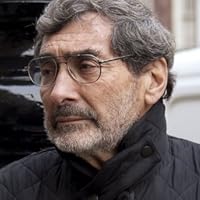Sentence Structure Quotes
Quotes tagged as "sentence-structure"
Showing 1-4 of 4

“What the semicolon's anxious supporters fret about is the tendency of contemporary writers to use a dash instead of a semicolon and thus precipitate the end of the world. Are they being alarmist?”
― Eats, Shoots & Leaves: The Zero Tolerance Approach to Punctuation
― Eats, Shoots & Leaves: The Zero Tolerance Approach to Punctuation

“I ran across an excerpt today (in English translation) of some dialogue/narration from the modern popular writer, Paulo Coelho in his book: Aleph.(Note: bracketed text is mine.)... 'I spoke to three scholars,' [the character says 'at last.'] ...two of them said that, after death, the [sic (misprint, fault of the publisher)] just go to Paradise. The third one, though, told me to consult some verses from the Koran. [end quote]' ...I can see that he's excited. [narrator]' ...Now I have many positive things to say about Coelho: He is respectable, inspiring as a man, a truth-seeker, and an appealing writer; but one should hesitate to call him a 'literary' writer based on this quote. A 'literary' author knows that a character's excitement should be 'shown' in his or her dialogue and not in the narrator's commentary on it. Advice for Coelho: Remove the 'I can see that he's excited' sentence and show his excitement in the phrasing of his quote.(Now, in defense of Coelho, I am firmly of the opinion, having myself written plenty of prose that is flawed, that a novelist should be forgiven for slipping here and there.)Lastly, it appears that a belief in reincarnation is of great interest to Mr. Coelho ... Just think! He is a man who has achieved, (as Leonard Cohen would call it), 'a remote human possibility.' He has won lots of fame and tons of money. And yet, how his preoccupation with reincarnation—none other than an interest in being born again as somebody else—suggests that he is not happy!”
―
―

“He had entered another imaginative world, one connected to the beginning of his life as a writer, to the Napoleonic world that had been a lifelong metaphor for the power of art, for the empire of his own creation He began to dictate notes for a new novel, "fragments of the book he imagines himself to be writing." As if he were now writing a novel of which his own altered consciousness was the dramatic center, he dictated a vision of himself as Napoleon and his own family as the Imperial Bonapartes....William and Alice he grasped with his regent hand, addressing his 'dear and most esteemed brother and sister.' To them, to whom he had granted countries, he now gave the responsibility of supervising the detailed plans he had created for 'the decoration of certain apartments, here of the Louvre and Tuileries, which you will find addressed in detail to artists and workment who take them in hand.' He was himself the 'imperial eagle.'
Taking down the dictation, Theodora [his secretary] felt it to be almost more than she could bear. 'It is a heart-breaking thing to do, though, there is the extraordinary fact that his mind does retain the power to frame perfectly characteristic sentences.”
― Henry James: The Imagination of Genius, A Biography
Taking down the dictation, Theodora [his secretary] felt it to be almost more than she could bear. 'It is a heart-breaking thing to do, though, there is the extraordinary fact that his mind does retain the power to frame perfectly characteristic sentences.”
― Henry James: The Imagination of Genius, A Biography
“Wieder ist ein Jahr vergangen: allmählich wird mir dieser ewigwährende Zyklus ein wenig leid,
wozu verschiedene Faktoren, deren Urheber ich in diesem Zusammenhang, um mich keinen
Unannehmlichkeiten, deren Folgen, die in Kauf zu nehmen ich, der ich gerne Frieden halte,
gezwungen wäre, nicht absehbar wären, auszusetzen, nicht nennen möchte, beitragen.”
― Mitteilungen An Max Über Den Stand Der Dinge Und Anderes
wozu verschiedene Faktoren, deren Urheber ich in diesem Zusammenhang, um mich keinen
Unannehmlichkeiten, deren Folgen, die in Kauf zu nehmen ich, der ich gerne Frieden halte,
gezwungen wäre, nicht absehbar wären, auszusetzen, nicht nennen möchte, beitragen.”
― Mitteilungen An Max Über Den Stand Der Dinge Und Anderes
All Quotes
|
My Quotes
|
Add A Quote
Browse By Tag
- Love Quotes 98.5k
- Life Quotes 76.5k
- Inspirational Quotes 73.5k
- Humor Quotes 44k
- Philosophy Quotes 30k
- Inspirational Quotes Quotes 27k
- God Quotes 26.5k
- Truth Quotes 24k
- Wisdom Quotes 24k
- Romance Quotes 23.5k
- Poetry Quotes 22.5k
- Death Quotes 20k
- Life Lessons Quotes 20k
- Happiness Quotes 19k
- Quotes Quotes 18k
- Hope Quotes 18k
- Faith Quotes 18k
- Inspiration Quotes 17k
- Spirituality Quotes 15k
- Religion Quotes 15k
- Motivational Quotes 15k
- Writing Quotes 15k
- Relationships Quotes 14.5k
- Life Quotes Quotes 14.5k
- Love Quotes Quotes 14k
- Success Quotes 13.5k
- Time Quotes 12.5k
- Motivation Quotes 12.5k
- Science Quotes 11.5k
- Motivational Quotes Quotes 11.5k

